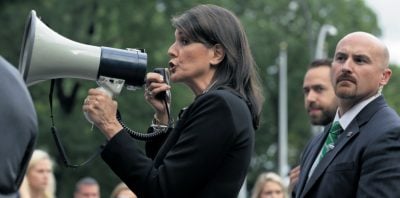Venezuela: The Dodgy Dealings of US-EU Sponsored NGOs at the Colombian Border
Nina Cross exposes the American-backed NGOs on the Colombian border working to undermine their socialist neighbour

The narrative of a “humanitarian crisis” in Venezuela is being driven aggressively by the US, the EU and Colombia, while their NGOs operate at the Colombian border.
But what if NGOs are being used to influence how the movement of people from Venezuela into Colombia is being shaped and reported? To explore the idea, let’s take a look at Mercy Corps.
Mercy Corps is funded by the EU and US to the tune of $500,000 for its global operations. Its financers have included Britain’s Department of International Development, which has regularly sent aid via Mercy Corps to rebel-held areas in Syria. Other funders include the Bill and Melinda Gates Foundation and the Clinton Foundation.
In March, Mercy Corps carried out a “rapid needs assessment” (RNA) of migrants arriving at two main points along the Colombian border.
The information gathered was used to demonstrate the dangers involved during and after crossings from Venezuela, and the reasons for leaving.
It is on the second point the people interviewed by Mercy Corps all say the same thing: there is an economic crisis taking place in Venezuela, linked to hyper-inflation.
These problems have been investigated by independent UN inspectors and independent journalists who explain that a cycle exists of hoarding by corporations, leading to black market trading, leading to inflation.
These are a result of the economic sanctions imposed for years upon Venezuela by the US and now the EU.
However, the NGO is not concerned with narratives that expose US and EU complicity and, as such, its recommendations fail to include the most obvious — end the sanctions and stop the hostility towards Venezuela as they are inflicting hardship on its population.

Mercy Corps has expanded its operations in Colombia to meet the urgent needs of Venezuelans. (Source: Mercy Corps)
Instead, Mercy Corps’ RNA identified three basic needs to be met by the Colombian government: a path to legal entry into Colombia that did not involve passports, the legal right to work in Colombia with the same wages and protections as Colombians and access to shelter, food and water.
A month later, the Colombian government agreed that migrants could register, without passports, at any of the 500-plus check points it would set up along the Colombian border over a two-month period, to end in June.
The reason given was to see how many Venezuelans were entering Colombia. The check points were spread along the 1,500-mile border.
Any information supplied by migrants at the checkpoints would be retained by NGOs, not passed to government departments.
By August, the Colombian government agreed that nearly half a million Venezuelans could remain in Colombia for up to two years, look for employment and access basic services. The reason given for this change was to accommodate humanitarian needs.
This change in policy was a reversal of the government’s ruling in February, when up to 3,000 Colombian soldiers were stationed along the border to check for passports.
This tightening of rules was referred to as a “diplomatic closure” and the government claimed that in a short time the number of migrants had fallen by 30 per cent.
Yet within a few weeks the Colombian government U-turned its policy, to allow the unhindered movement of Venezuelans, and NGOs such as Mercy Corps were conscripted to enable the process.
The new policy of the Colombian government met exactly the needs identified by Mercy Corps, suggesting that the campaign for this migration was an international, organised effort.
Since the government changed its policy, the number of people leaving Venezuela has increased. According to the Migration Policy Institute, an organisation affiliated to the EU, the number of Venezuelans entering Peru almost quadrupled over a four-month period: from 100,000 in March 2018 to nearly 350,000 in early June.
As the exodus expands, the humanitarian needs of migrants grow more urgent.
The situation is now being called a “regional humanitarian crisis,” creating a picture of unimaginable catastrophe that needs external intervention.
Recently, US UN ambassador Nikki Haley called a meeting at the UNSC to address what could be done regarding Venezuela’s crisis, while Luis Almagro of the Organisation of American States, which is heavily funded by the US, suggested a military intervention.
This escalating crisis narrative of an expanding exodus is placing Venezuela under intense scrutiny. While punishing Venezuela with sanctions from the front, and promoting a migration crisis from behind, the EU and US, with the co-operation of Colombia, are attempting to box Venezuela into a more isolated and vulnerable position.
Colombia has made a powerful alliance with the EU, and soon after changing its policy on Venezuelan passports it became a Nato partner, further cementing its EU and US partnerships. At the UN Colombia has been commended for its humanitarianism by its allies.
Meanwhile, Mercy Corps has consistently driven a narrative of a full-blown humanitarian crisis and rampant violence under President Nicolas Maduro, including allegations of repression and torture.
It is playing its part as a propaganda tool in vilifying the Venezuelan government, enabling its US and EU funders to continue their sanctions leading to hardship for Venezuelans, the root cause for leaving their country, as explained in Mercy Corps’ own needs assessment.
*
Note to readers: please click the share buttons above. Forward this article to your email lists. Crosspost on your blog site, internet forums. etc.
Featured image is from the author.

